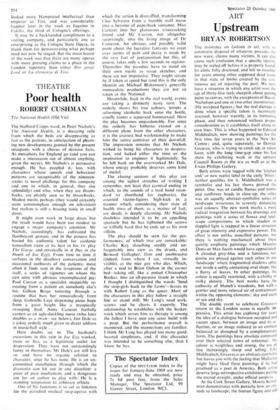THEATRE
Poor health
ROBERT CUSHMAN
The National Health (Old Vic) The Stafford Cripps ward, in Peter Nichols's The National Health, is a decaying relic from which the beds are disappearing as fast as the patients, in anticipation of gleam- ing new developments greeted by the present occupants with a chorus of derisive farts. As-metaphors for England go (and you can make a microcosm out of almost anything, given the nerve), Mr Nichols's is persuasive enough. He has peopled it, too, with characters whose speech and behaviour patterns are recognisably of the nineteen- sixties (a novel challenge for this company and one to which, in general, they rise splendidly) and who, when they are throw- backs, are plainly seen to be throwbacks. Modest merits perhaps (they would certainly seem commonplace enough on television) but realism is still a bracing tonic in small doses.
It might even work in large doses but the result would have been too modest to engage a major company's attention. Mr Nichols, accordingly, • has cultivated the flamboyant gesture, and in the process has buried his authentic talent for sardonic naturalism (seen at its best in his 'iv play The Gorge, and erratically in A Day in the Death of Joe Egg). From time to time it surfaces in the desultory conversation and occasional outbursts of the patients; more often it finds vent in the irruptions of the staff, a series of vignettes on whom the cast seize with obvious uncomplicated joy: Paul Curran as a specialist snappishly re- treating from a patient on somebody else's list, Gillian Barge tottering through a routine that bars her remorselessly from sleep, Gabrielle Laye dispensing pious hope from a great height like a myopically swooping bird, Anna Carteret fretfully earnest as an ugly-duckling nurse (who later doubles as a swan—see below), Jim Dale as a jokey orderly much given to direct address in music-hall style . . .
Here doubts set in. The husband's excursions in this vein in Joe Egg worked, more or less, as a legitimate outlet for desperation. They were not outstandingly funny in themselves. Mr Dale's are still less so, and have no organic relation to character, since he has none. He is an un- committed mouthpiece through which the dramatist can hit out in any direction: a piece of pure mechanism, and a dangerous toy for an author to play with. He is a standing temptation to arbitrary effects.
One of his functions is to act as linkman for the parodied medical soap-operas with which the action is diversified, transforming Cleo Sylvestre from a humble staff nurse into a heroine of paperback romance, Miss Carteret into her glamorous wisecracking friend and Mr Curran, not altogether surprisingly, into the living image of Dr Cameron. An obvious and possibly valid point about the lucrative fantasies we erect over scenes of pain and decay is made by the very fact of juxtaposition but this, of course, takes only a .few secgnds to register. Thereafter the parodies have to stand on their own merits as revue sketches, and these are not impressive. They might scrape by if taken at speed but (and this is the only blemish on Michael Blakemore's generally immaculate production) they are not so taken at the National.
Meanwhile, back in the real world, events are taking a distinctly nasty turn. The orderly shows his true colours, tempts a reforming alcoholic back onto the bottle, cruelly taunts a repressed homosexual. Here the play becomes unpardonable. For since the orderly has hitherto existed on a different plane from the other characters, it is the crassest bad workmanship to make him the active contriver of their downfall. The impression remains that Mr Nichols wished to bring his characters to despera- tion, and lacked either the time or the inspiration to engineer it legitimately. So he fell back on the overworked Mr Dale, whose energy probably deserves some kind of medal.
The closing sections of this play are among the ugliest stretches of writing I remember, not least that carnival ending in which, to the sounds of a trad band (stan- dard NT shorthand for euphoria), the assorted victim-figures high-kick in a manner which, considering their state of health (two of them, as a matter of fact, are dead), is deeply alarming. Mr Nichols doubtless intended it to be an appalling spectacle but he has tightened the screws so wilfully hard that he ends up as his own villain.
The play should be seen for the per- formances, of which two' are remarkable: Charles Kay slouching seedily and un- forgettably into view as the drunk, and Bernard Gallagher, firm and unobtrusive (indeed, from where I sat, virtually in- visible), as the nice guy who dies. Which, after a nod to Brian Oulton in the corner bed—taking off, like a potted Christopher Booker, into an all-purpose tirade in which I thought I distinguished the words 'Send the strip-girls back to the farms'—leaves us with Robert Lang as the queer. Most of the characters in this play follow a straight line or stand still; Mr Lang's road cork- screws and he charts it expertly. The relationship he establishes with the basket- work which serves him as therapy is among the fullest I have seen any actor build with a prop. But the performance overall is mannered, and the mannerisms are familiar.
I think Mr Lang has played too many good- hearted simpletons, and, if this character was intended to be something else, then I know he has.


















































 Previous page
Previous page